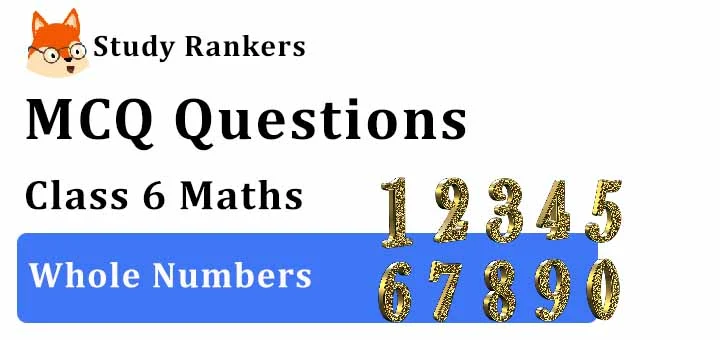MCQ Questions for Class 7 Maths: Ch 2 Whole Numbers

1. Which of the following statements is not true?
(a) The HCF of two distinct prime numbers is 1
(b) The HCF of two co prime numbers is 1
(c) The HCF of two consecutive even numbers is 2
(d) The HCF of an even and an odd number is even
► (d) The HCF of an even and an odd number is even
2. By using dot (•) patterns, which of the following numbers can be arranged in all the three ways namely a line, a triangle and a rectangle?
(a) 9
(b) 10
(c) 11
(d) 12
► (b) 10
3. When rounded off to nearest thousands, the number 85642 is
(a) 85600
(b) 85700
(c) 85000
(d) 86000
► (d) 86000
4. Which of the following is not true
(a) (7 + 8) + 9 = 7 + (8 + 9)
(b) (7 x 8) x 9 = 7 x (8 x 9)
(c) 7 + 8 x 9 = (7 + 8) x(7+ 9)
(d) 7 x (8 + 9) = (7 x 8) + (7 x 9)
► (c) 7 + 8 x 9 = (7 + 8) x(7+ 9)
5. The largest number which always divides the sum of any pair of consecutive odd numbers is
(a) 2
(b) 4
(c) 6
(d) 8
► (b) 4
6. 3 x 10000 + 7 x 1000 + 9 x 100 + 0 x10 + 4 is the same as
(a) 3794
(b) 37940
(c) 37904
(d) 379409
► (c) 37904
7. Number of whole numbers between 38 and 68 is
(a) 31
(b) 30
(c) 28
(d) 29
► (d) 29
8. What is the additive identity element of 24?
(a) 1/24
(b) 1
(c) 0
(d) 24
► (c) 0
9. What is the predecessor of natural number 1?
(a) 0
(b) 2
(c) 10
(d) Does not exist
► (d) Does not exist
10. If 1 is added to the greatest 7- digit number, it will be equal to
(a) 10 thousand
(b) 1 lakh
(c) 10 lakh
(d) 1 crore
► (d) 1 crore
11. What are the three consecutive predecessors of 70010?
(a) 70009, 70008, 7007
(b) 70009, 70008, 70010
(c) 70009, 70008, 70007
(d) 70009
► (c) 70009, 70008, 70007
12. The largest 5-digit number having three different digits is
(a) 98978
(b) 99897
(c) 99987
(d) 98799
► (c) 99987
13. Which is the whole number that does not have a predecessor?
(a) 100
(b) 0
(c) 1
(d) 9
► (b) 0
14. If the number 7254*98 is divisible by 22, the digit at * is
(a) 1
(b) 2
(c) 6
(d) 0
► (c) 6
15. Which is the whole number that does not have a predecessor?
(a) 100
(b) 0
(c) 1
(d) 9
► (b) 0
16. Which of the following is the greatest number that can be formed by the digits 7, 0, 9, 8, 6 and 3?
(a) 9, 87, 360
(b) 9, 87, 063
(c) 9, 87, 630
(d) 9, 87, 603
► (c) 9, 87, 630
17. The number of distinct prime factors of the smallest 5-digit number is
(a) 2
(b) 4
(c) 6
(d) 8
► (a) 2
18. The number of distinct prime factors of the largest 4-digit number is
(a) 2
(b) 3
(c) 5
(d) 11
► (b) 3
19. The predecessor of 1 lakh is
(a) 99000
(b) 99999
(c) 999999
(d) 100001
► (b) 99999
20. What is 238 ÷ 238?
(a) 0
(b) 238
(c) 28
(d) 1
► (d) 1
21. The successor of 1 million is
(a) 2 millions
(b) 1000001
(c) 100001
(d) 10001
► (b) 1000001
22. What is the quotient of 64 ÷ 1?
(a) 1
(b) 0
(c) 46
(d) 64
► (d) 64
